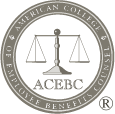John R. Lindquist
John R. Lindquist, who advocated for changes in retirement plan law and was a key leader in the employee benefits bar, died in 1989 at age 67. A standout practitioner in retirement plan tax law both before and after enactment of the complex Employee Retirement Income Security Act of 1974 (“ERISA”), John was inducted as a Charter In Memoriam Fellow of the American College of Employee Benefits Counsel (the “College”) in 2000.
John earned his B.S. in 1943 from Northwestern University and from 1943 to 1945 served our country as a naval officer on a destroyer in the Pacific Theater in World War II. His most vivid memory of that time was of a battle in which his ship was attacked by kamikaze aircraft. John received his J.D. in 1948 from Northwestern University School of Law (in 2015 renamed Northwestern University Pritzker School of Law).
In 1948, he joined the Chicago firm of McDermott Will & Emery. In his 35 years with the firm, John specialized in the tax laws applicable to retirement plans, representing clients of all sizes. Over the period from 1954 to 1973, John built his firm’s employee benefits practice. After enactment of ERISA, which both built on and modified prior law, John continued to lead that department and served on the firm’s management committee from 1972 until his retirement in 1983.
John, whose practice area dealt with special tax breaks for retirement benefits in plans that “qualified” by meeting tax law requirements, was on the frontlines of pension change as one of the advocates for key pre-ERISA legislation to extend “qualified” plan rights. An example is his testimony on behalf of his firm raising concerns about limits on benefits for self-employed and smaller businesses before the May 11 and 12, 1960 Senate Committee on Finance hearing, “Pension Plans for Owner-Managers of Corporations,” regarding H.R. 10. The bill was eventually enacted as the Self-Employed Individuals Tax Retirement Act of 1962 (Public Law 87-792), pivotal legislation that permitted self-employed individuals to establish tax-qualified retirement plans. He also appeared before Congress on several other occasions over the years, such as on behalf of the Profit Sharing Council of America before the Subcommittee on Private Pension Plans of the Committee on Finance on the subject of private pension plan reform on July 11, 1973.
His extensive experience was shared with others in publications and in speaking. His role as an authority helping the profession understand the law is evident in his article, “The Pension Remodeling Act of 1974,” 52 Taxes 873 (1974), in which John discussed the then-new law ERISA and his prediction that the future of the private pension system would be in either the general area of defined contribution plans or employer-sponsored Individual Retirement Arrangements (“IRAs”).
John’s leadership in the field also extended to professional groups including the Chicago Bar Association (Chair of the Employee Benefits Committee from 1970 to 1971), the American Bar Association (“ABA”) Real Property, Probate and Trust Law (“RPPT”) Section (Section Council 1977- 1983) (RPPT later was renamed as Real Property, Trust and Estate Law), and the American Bar Retirement Association (Director and Trustee 1982 to 1986). He participated in the Illinois State Bar Association and, in 1976, chaired the Midwest Pension Conference. John also contributed his talents as a public member of the Illinois Legislature’s Illinois Public Employees Pension Laws Commission (1978 to 1984). Efforts as a proponent (with others) for formation of an ABA Employee Benefits Section, while unsuccessful, triggered formation in 1981 of the ABA’s Joint Committee on Employee Benefits (“JCEB”). The JCEB was established to coordinate employee benefits activities and efforts to share knowledge about the new law among several ABA Sections with involvement in employee benefits law. In the early years of the JCEB, John served as a JCEB representative of the ABA RPPT Section. The JCEB played a central role in the formation of the College.
College Fellow Peter Kelly, mentored by John during the period from 1973 through 1981, noted John’s remarkable helpfulness and strengths as a leader in the employee benefits bar. John’s depth of knowledge and tremendous record of participation over years of developing pension law gave him made him an invaluable teacher. Well-respected for his leadership, expertise, and experience, John also was known by colleagues for his kindness.
Photo Source: The Decade Book, American College of Employee Benefits Counsel 2000-2010


